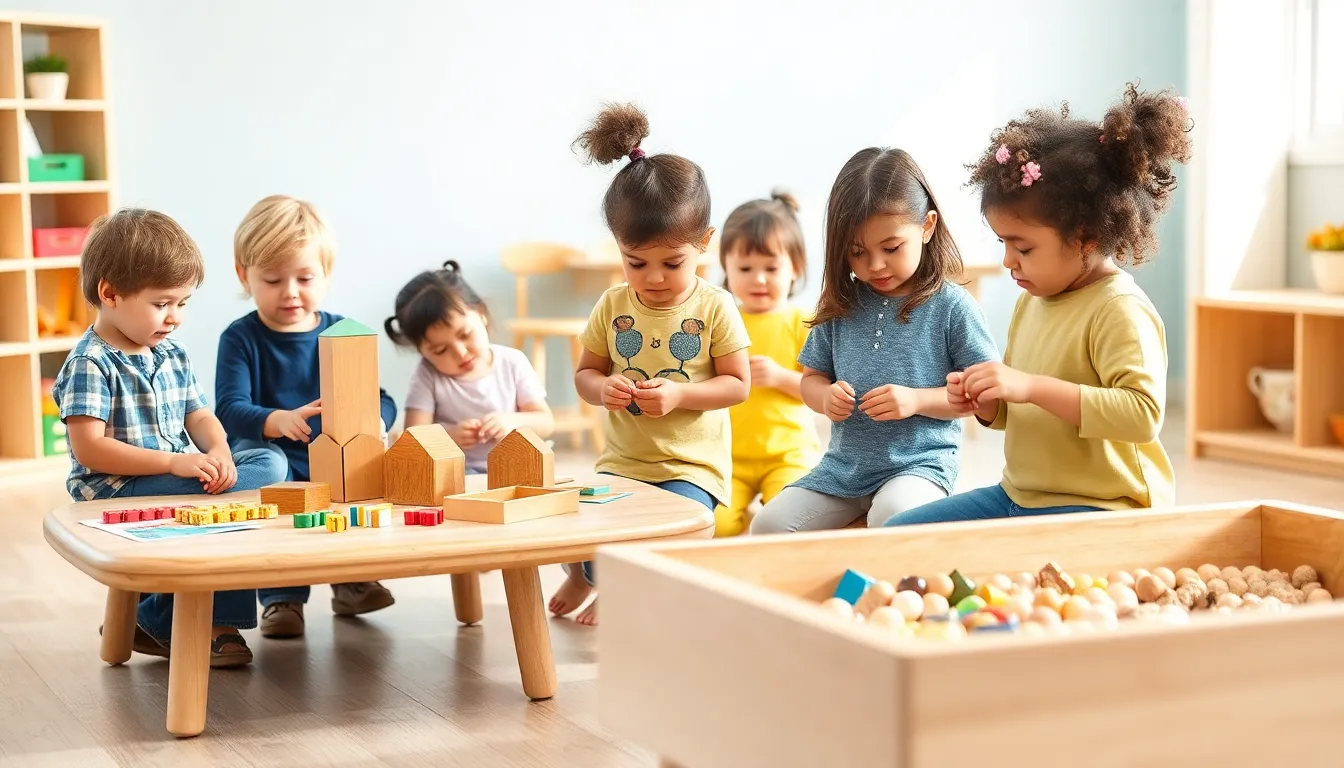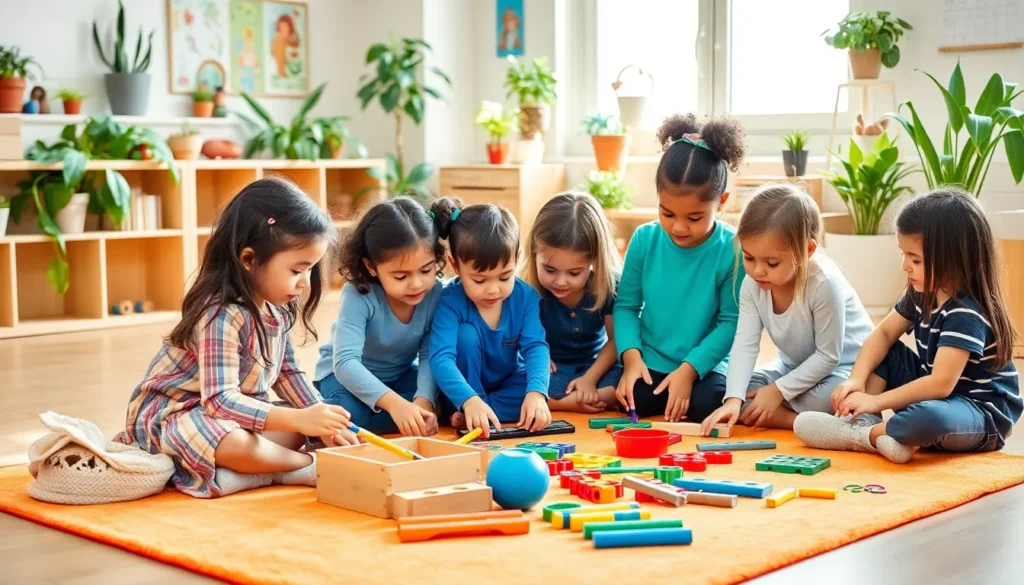Table of Contents
ToggleIn a world where kids seem to have endless energy and curiosity, finding the right environment for their growth can feel like searching for a needle in a haystack. Enter the Montessori Child Development Center—a magical place where learning feels less like a chore and more like an adventure. Here, kids don’t just sit at desks; they explore, create, and discover at their own pace, all while mastering the art of independence.
Imagine a classroom where children choose their own activities, engage in hands-on learning, and develop social skills without the pressure of traditional schooling. It’s like a playground for the mind, where every day is filled with exciting possibilities. So, if you’re ready to watch your child thrive in an environment designed just for them, the Montessori approach might just be the secret ingredient to their success.
Overview Of Montessori Child Development Center
Montessori Child Development Centers provide an innovative educational environment tailored for young learners. These centers focus on fostering a child’s natural curiosity and desire to learn through hands-on experiences. Various materials and activities support independent exploration, allowing children to choose tasks that resonate with their interests.
Social development plays a crucial role in the Montessori philosophy. Children engage with peers in cooperative play, encouraging teamwork and communication skills. They learn to respect others’ opinions and collaborate towards shared goals, creating a foundation for strong interpersonal relationships.
Curriculum flexibility characterizes the Montessori approach. Teachers guide rather than direct, observing students and offering assistance when necessary. This ensures individualized learning paths where children progress at their own pace, mastering concepts before moving on.
The environment is intentionally designed to promote independence. Classrooms are filled with accessible materials that encourage children to take responsibility for their learning. By managing their tasks, kids develop self-discipline and confidence, essential traits for future success.
Parental involvement is another critical component in Montessori Child Development Centers. Parents receive guidance on fostering the Montessori approach at home, creating a seamless connection between school and family life. This collaboration enhances children’s learning experiences and reinforces key concepts.
Overall, the Montessori Child Development Center offers a holistic education model. By emphasizing exploration, social skills, and personalized learning, it prepares children for lifelong learning and adaptability in an ever-changing world.
Key Principles Of Montessori Education

Montessori education focuses on fostering a child’s natural development through several key principles.
Child-Centered Learning
Child-centered learning stands at the core of Montessori education. Each child has unique needs and interests, and the curriculum adapts to reflect this individuality. Teachers observe children’s choices and tailor activities accordingly, promoting autonomy. Learning occurs at a self-directed pace, allowing children to engage deeply with their interests. Independence fosters confidence, enabling kids to make decisions about their learning. Emphasizing collaboration, children often work together, enhancing social skills and teamwork. Instead of a traditional teacher-led model, educators act as guides, facilitating exploration rather than dictating actions.
Hands-On Activities
Hands-on activities play a crucial role in Montessori education. Children interact with materials designed for sensory engagement and cognitive development. These interactive experiences cater to various learning styles, ensuring all children effectively absorb knowledge. Practical activities, such as sorting, measuring, and building, help develop fine motor skills while stimulating curiosity. Engaging with tangible materials allows children to grasp abstract concepts more easily. They learn through experimentation and discovery, reinforcing critical thinking and problem-solving skills. This approach encourages children to explore their environment and learn by doing, creating a strong foundation for lifelong learning.
Benefits Of Enrolling In A Montessori Child Development Center
Montessori Child Development Centers offer numerous advantages for young learners. Specifically, these centers emphasize a child’s growth in independence and social skills.
Enhanced Independence
Children gain a strong sense of independence through Montessori education. They choose their activities, allowing them to take charge of their learning experience. This autonomy promotes self-motivation and accountability. In environments designed for exploration, kids tackle tasks suited to their interests. Teachers guide rather than dictate, fostering decision-making abilities. These opportunities encourage children to set personal goals and strive to achieve them. As they engage with materials, kids learn to solve problems independently, boosting their confidence. Ultimately, nurturing independence becomes critical in preparing children for future challenges.
Social Skills Development
Montessori centers prioritize social skills development, creating an environment conducive to interaction. Children work collaboratively with peers, practicing essential communication and teamwork skills. Group activities foster empathy and respect for others’ perspectives. Through cooperative play, kids learn to navigate social situations and resolve conflicts effectively. Structured yet flexible environments allow for diverse interactions that enhance emotional intelligence. Teachers facilitate discussions, encouraging constructive feedback and peer support. As learners engage in shared projects, they develop trust and lifelong friendships. This nurturing atmosphere enriches every child’s social competence and prepares them for future relationships.
Curriculum Structure Of Montessori Child Development Center
The Montessori curriculum is designed to foster holistic development in children. It encompasses various academic areas and essential life skills.
Academic Areas
Montessori education emphasizes key academic subjects. Language development encourages reading and writing through interactive activities. Math concepts receive focus with hands-on materials, allowing children to explore numbers and operations. Science and cultural studies include experiments and lessons on the world, nurturing curiosity. Creative arts, such as music and visual arts, enable self-expression and innovation. Each child engages in these subjects according to their interests, making learning enjoyable and effective.
Life Skills
Life skills form a crucial part of the Montessori curriculum. Independence is developed through daily activities like cleaning and organizing. Children learn to make choices, fostering problem-solving skills. Social interactions, emphasized through collaborative play, enhance communication and teamwork. Responsibility is encouraged by assigning tasks that instill a sense of accountability. Resilience is nurtured as children navigate challenges within a supportive environment. These skills equip children for success beyond the classroom, preparing them for real-world interactions.
Choosing The Right Montessori Child Development Center
When selecting a Montessori Child Development Center, consider the school’s adherence to core Montessori principles. Look for a focus on child-centered learning and individualized curriculums designed to cater to each child’s unique needs and interests.
Evaluate the classroom environment, as it should encourage independence and exploration. Classrooms filled with hands-on materials provide opportunities for sensory engagement. Pay attention to teacher qualifications, ensuring they are trained in the Montessori method and skilled in facilitating rather than directing learning.
Assess parental involvement options available at the center. Active communication between parents and educators creates a cohesive learning experience and supports the Montessori approach at home.
Review the center’s curriculum structure, which should encompass all academic areas, including language development, math, science, cultural studies, and creative arts. Each area should promote life skills such as problem-solving, communication, and responsibility.
Explore the emphasis on social skills development, which plays a crucial role in enhancing collaboration and communication among children. Group activities encourage respect, empathy, and conflict resolution, preparing children for future relationship dynamics.
Visit multiple centers to observe their atmospheres, educational practices, and teacher interactions. Authentic Montessori experiences allow children to thrive within a stimulating and engaging environment.
Inquire about specific programs and resources that support children’s interests and hobbies. A well-rounded environment prioritizes a balanced approach, integrating holistic education with practical applications for real-world interactions.
Choosing a Montessori Child Development Center can significantly impact a child’s growth and learning journey. The emphasis on independence and social skills prepares children for future challenges while fostering a love for learning. With a curriculum designed around each child’s unique interests, the Montessori approach nurtures curiosity and critical thinking.
Parents play a vital role in this process, reinforcing the principles learned in the classroom at home. By selecting a center that aligns with Montessori values, families can ensure a supportive and enriching environment that promotes holistic development. Ultimately, the Montessori experience equips children with the skills they need to thrive in an ever-evolving world.







